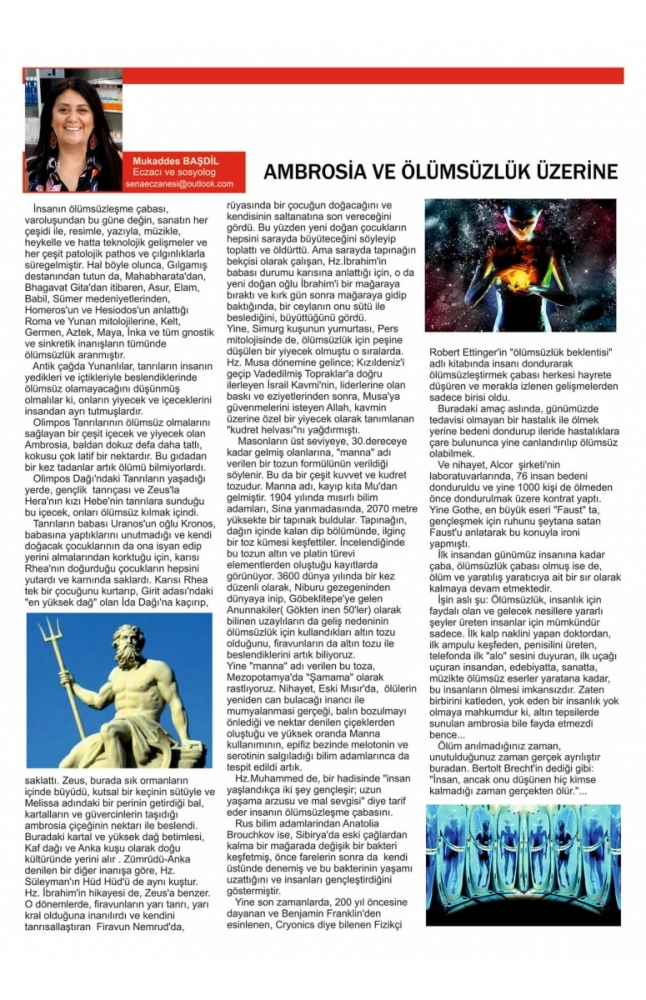No products

ON AMBROSIA AND IMMORTALITY
Man's struggle for immortalization has continued since the dawn of time, through all forms of art, painting, writing, music, sculpture and even technological developments and all kinds of pathological pathos and madness. As such, from the epic of Gilgamesh, the Mahabharata, the Bhagavat Gita, the Assyrian, Elamite, Babylonian, Sumerian civilizations, the Roman and Greek mythologies narrated by Homer and Hesiodos, the Celtic, Germanic, Aztec, Mayan, Inca and all gnostic and syncretic beliefs have all sought immortality. In antiquity, the Greeks must have thought that the gods could not be immortal if they fed on human food and drink, so they kept their food and drink separate from human food and drink. Ambrosia, a kind of drink and food that made the gods of Olympus immortal, is a nectar nine times sweeter than honey and has a very delicate odor. Those who tasted this food once did not know death anymore. This drink, offered to the gods by Hebe, the goddess of youth and daughter of Zeus and Hera, on Mount Olympus, where the gods lived, was meant to make them immortal. Cronus, the son of Uranus, the father of the gods, swallowed all the children born to his wife Rhea and hid them in his belly because he had not forgotten what he had done to his father and feared that his own children would rebel against him and take his place. His wife Rhea saved only one child and smuggled it to Mount Ida, "the highest mountain" on the island of Crete, and hid it. Here Zeus grew up in dense forests, fed on the milk of a sacred goat, honey brought by a nymph named Melissa, and the nectar of the ambrosia flower carried by eagles and doves. The image of the eagle and the high mountain here takes its place in eastern culture as Mount Kaf and the phoenix. According to another belief called the Phoenix, Solomon's Hüd Hüd is the same bird. In those times, pharaohs were believed to be demigods, half-gods, half-kings, and Pharaoh Nemrud, who deified himself, saw in his dream that a child would be born and end his reign. For this reason, he said that he would raise all the newborn children in the palace and had them collected and killed. But Abraham's father, who worked in the palace as a guard of the temple, told his wife about the situation, so she left her newborn son Abraham in a cave, and when she went to the cave forty days later, she saw that a gazelle was feeding him with its milk and raising him. Again, the egg of the bird Simurg was a food sought after for immortality in Persian mythology at that time. As for the time of Moses, after the Tribe of Israel had crossed the Red Sea into the Promised Land and were oppressed and persecuted by their leaders, God, who wanted them to trust Moses, rained down on them "manna", which was described as a special food. It is said that Freemasons who have reached the upper level, the 30th degree, are given the formula for a powder called "manna". This is a kind of powder of strength and power. The name manna comes from the lost continent of Mu. In 1904, Egyptian scientists found a temple on the Sinai peninsula at an altitude of 2070 meters. At the bottom of the temple, which was inside the mountain, they discovered an interesting dust cluster. When analyzed, it is recorded that this dust is composed of gold and platinum-derived elements. We now know that the reason for the arrival of the aliens known as the Anunnaki (50's who descended from the sky), who came to Göbeklitepe from the planet Niburu once in 3600 earth years, was the gold dust they used for immortality, and that the pharaohs were also fed with gold dust. Again, we come across this powder called "manna" as "Shamama" in Mesopotamia. Finally, the fact that the dead were mummified in Ancient Egypt with the belief that they would come back to life, that honey prevents spoilage and is composed of flowers called nectar, and that high levels of manna release melotonin and serotinin in the pineal gland have been established by scientists. In one of his hadiths, the Prophet Muhammad described the human effort to become immortal as "as man grows old, two things grow younger: the desire to live long and the love of wealth". Anatolia Brouchkov, a Russian scientist, discovered a different bacterium in an ancient cave in Siberia, tested it first on mice and then on himself, and showed that it prolongs life and rejuvenates people. More recently, physicist Robert Ettinger's attempt to immortalize human beings by freezing them in his book "the prospect of immortality", known as Cryonics, which dates back 200 years and was inspired by Benjamin Franklin, was just one of the developments that amazed everyone and was followed with curiosity. The idea is that instead of dying of a disease for which there is no cure today, the body can be frozen and then revived and become immortal when a cure is found. And finally, in the laboratories of the Alcor company, 76 human bodies were frozen and another 1000 people contracted to be frozen before they died. Again, Gothe, in his greatest work "Faust", made irony on this subject by telling the story of Faust who sold his soul to the devil in order to become younger. From the first human beings to the present day, the effort has been for immortality, but death and creation remain a mystery belonging to the Creator. The truth of the matter is that immortality is only possible for people who do good for humanity and produce things that are useful for future generations. From the doctor who performed the first heart transplant, to the man who discovered the first light bulb, the man who produced penicillin, the man who made the first "hello" on the telephone, the man who flew the first airplane, to the man who created immortal works of literature, art and music, it is impossible for these people to die. Anyway, a humanity that slaughters and destroys each other is doomed to perish, and I don't think even the ambrosia offered on golden platters would help... Death is the real departure when you are not remembered, when you are forgotten. As Bertolt Brecht said: "One really dies only when there is no one left to think of him."...

